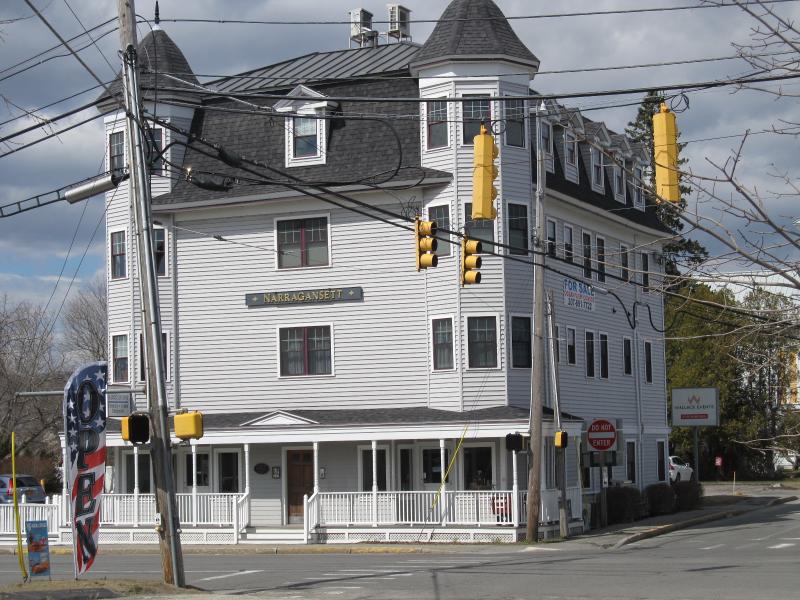One hundred years ago, Rockland’s Narragansett Hotel was emergency hospital during influenza pandemic
ROCKLAND—An article found in the October 4, 1918 issue of Courier-Gazette reflects an eerie similarity to what Midcoast citizens are reading daily from their local newspapers in the spring of 2020. The title of that story was: “Situation in Rockland.” The subhead read: “Physicians report 250 cases of influenza, mostly mild ones—three deaths—schools, churches, theatres, etc. are ordered closed.”
In 1918, the “situation” in Rockland was happening all over the state as health commissioners were urging mayors to close public spaces to prevent the spread of what was then called “Spanish influenza” or “the grippe.” Nurses were making gauze masks and authorities were urging the halting of all “unnecessary travel.”
It was only a matter of time before the disease infiltrated the Midcoast. On Friday, October 11, the Camden Congregational Church was converted into a hospital and on Friday, October 18, the Narragansett Hotel, long popular with train travelers, was the area’s first hotel converted into a temporary hospital, in response to the state prison in Thomaston having reported 80 cases of influenza with eight deaths.
Friday, October 18, 1918
“The State Prison in Thomaston reports 80 cases of influenza with eight deaths. In order to meet the unusual conditions arising from the influenza epidemic in Rockland, the Narragansett Hotel has been opened as an emergency hospital, for the care of all classes and creeds, and without reference to financial circumstances.”
-Maine.gov’s history of The 1918 Pandemic Influenza in Maine
Fast forward more than 100 hundred years later and the Covid-19 pandemic has once, again, deeply impacted the hotel industry. On April 3, Gov. Mills issued an Executive Order that “also suspends lodging operations, including hotels, motels, bed and breakfasts, inns, and short-term rentals” with the exception of Essential Business and Operations.
And once again, history repeats itself as hotels and other lodging properties adjust their business models to shelter people directly affected by a pandemic.
Greg Dugal, Director of Government Affairs of Hospitality Maine, a trade group that represents the hospitality industry, said: “A small amount of branded and independent properties are remaining open to essential workers from Presque Isle down to Scarborough, everyone from health care workers to truck drivers. Basically the Order limits who can stay in a hotel, but at the end of the day, these are the people who most need a place to stay.”
The Clarion Hotel in Portland per WGME is donating 50 rooms per night for working medical staff at Maine Medical Center and Mercy Hospital.
Dugal also said that the Acadia Hotel Downtown in Bar Harbor announced they are accepting essential health care workers at no cost through April 30.
In the Midcoast, only a handful of hotels are open to essential workers and other vulnerable populations directly impacted by Covid-19.
The Penobscot Bay Chamber of Commerce has a “Who’s Open” button on their website, naming eight hotels, motels and inns still open under the stipulations of the Executive Order.
There are different reasons why people still need to leave their homes and travel. Besides essential workers such as traveling health care workers and those in the transportation industry, there are vulnerable populations affected by the state’s Executive Orders, including children who need emergency placements, people at risk of domestic violence, and homeless populations. “These eight properties that we’re aware of are open and will continue to be open under the Executive Order,” said the Chamber’s Executive Director Tom Peaco. “Properties could choose to open as quarantine facilities too if they wanted to. Some are more comfortable with that than others.”
In the middle of writing this story, one more wrinkle to the Executive Order came in the form of an April 9-10 snowstorm that blanketed the state, took out numerous trees and left some 250,000 households without power.
“As a result of that storm, we now have a lot of Central Maine Power line workers from out of state trying to get people back online with power,” said Peaco. “As they are also essential workers who need a place to stay, we now have several more properties not on that [Chamber] list who opened back up just to accommodate them. And not only that, we also have local people who are without power for a certain amount of time who need a place to stay, which is permitted under the provision of that Executive Order.”
Kay Stephens can be reached at news@penbaypilot.com



























